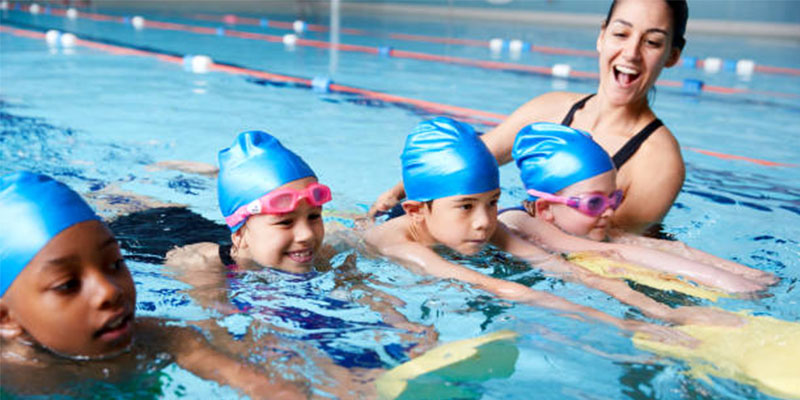
One of the great advantages to regularly practising a skill is that when you do it enough times, it becomes second nature—you’ve got that skill down pat and can move on to learn new things.
Muscle memory plays a huge part in enabling us to do this. The more times we practise something, the neurological and muscular processes at play help our body absorb the action and be able to repeat the action into the future.
When you enrol your child in kids swimming lessons and they have those first experiences in water, the journey to developing swimming muscle memory begins.
How does muscle memory work?
Muscle memory involves the following two elements.
1. Motor memory
Motor memory is the neurological process that takes place between the brain and the spinal cord that results in a person retaining motor skills. Complex movements intentionally practised over time can eventually be repeated without conscious effort. So, for example, if we once perfected breaststroke, but haven’t swum for years, we’ll probably do the stroke just fine when we next jump in the water.
2. Muscle nuclei
It’s believed muscle itself can develop a memory of training. When performing a physical skill, muscles may be building extra nuclei that are retained for the future, thereby allowing for an easy return to previous form (if training stops, the extra nuclei aren’t lost!).
Developing the right kind of muscle memory
Muscle memory kicks in whichever way we learn a skill, so it’s important to take the time to learn a skill correctly in the first place.
If we learn and practise with poor form or technique, we create muscle memory for that. So if your child learns to swim with poor coaching, or without coaching, and develops bad habits, it can be hard (though not impossible) for them to break those habits.
What are examples of poor swim habits?
Swimming habits you want your children to avoid are:
- incorrect breathing technique, which may cause your child to run out of breath in the water and struggle to stay afloat;
- swimming in a vertical, rather than horizontal, position, which may create breathing challenges for your child;
- incorrect stroke technique, which can deplete your child’s energy in the pool;
- incorrect head position, which can make it more challenging for your child to swim distances;
- entering the water without supervision.
- swimming may be more difficult for them, and they may become discouraged;
- they may not make the gains they would make with good technique, delaying their progression as a swimmer;
- they may not be able to get out of difficult situations in water, reposition themselves and remain calm, and thus, may be at increased risk of drowning.
How kids swimming lessons can help
Correctly executed aquatic swimming skills can help keep your kids out of trouble in the water. To help ensure your child learns the right way and gets the most out of muscle memory, take them to a kids swimming lesson.
Whether you’re starting with a baby swimming lesson or a toddler swimming lesson, good teaching of appropriate form and technique will mean your child isn’t learning steps they need to unlearn in the future.
(If they have already learned poor form and technique, all is not lost. A kids swimming lesson can help set your child’s swimming on the right path.)
The Kingswim Foundation program
Our Foundation program has been specially designed to teach children from 12 weeks to 3 years old all the skills they will ever need to be safe and have fun in and around the water. Repetition of essential swimming skills over time leads to the development of helpful muscle memory your child will carry throughout life.
Over the span of three years, our program covers all the basics, from your child becoming comfortable in the water, putting their face under, floating on their front and back, to kicking and paddling on their own, and developing balance and stability. They also learn key swim safety skills, which are added to as they progress further through our swimming programs.
If you’re interested in bringing your child to a Kingswim baby swimming lesson, toddler swimming lesson, or kids swimming lesson for older children, please enquire today!
